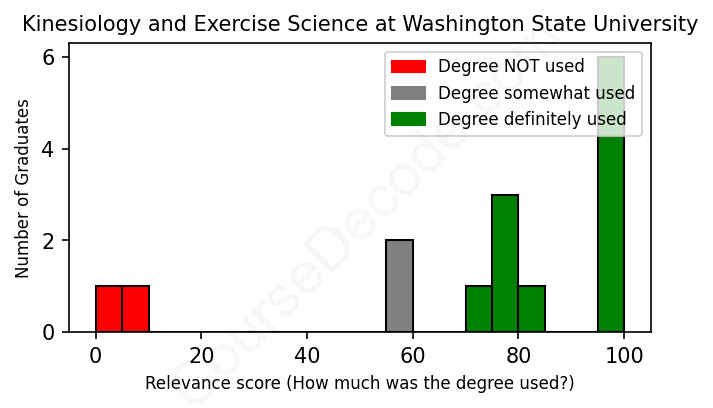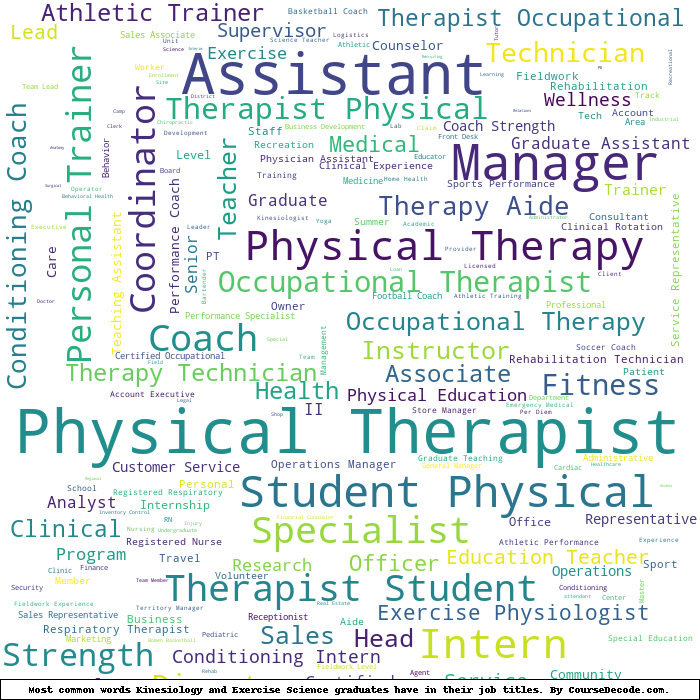
First, some facts. Of the Kinesiology and Exercise Science graduates from Washington State University we've analyzed , here's how many have used (or NOT used) their degree in their career:

These are estimates based on AI analysis of 15 LinkedIn profiles (see below).
The verdict? Above average. Overall, with an average relevance score of 73%, Kinesiology and Exercise Science graduates from Washington State University have a higher likelihood (+6%) of finding work in this field compared to the average graduate across all fields:
And for comparison, here's the chart for all profiles we've looked at across all degrees.
Also, after graduating, only 33% of these graduates have pursued further education other than another Bachelor's degree (such as a Masters degree or other), compared to the average across all profiles of 35%. This suggests a Bachelors degree is enough for most Kinesiology and Exercise Science graduates, and it's normal to look for work straight after graduation.
See the details:
|
Relevance score: 55% We think this person has gone into a career only somewhat relevant to their degree. We think this person has gone into a career only somewhat relevant to their degree.
DEGREE INFOGraduated in 2020 from Washington State University with a Bachelor of Science - BS in Kinesiology and Exercise Science. No other secondary education since. JOB HISTORY SINCE GRADUATIONStrength and Conditioning Intern Washington State University Feb 2020 - May 2020 Firefighter EMT  Peninsula Fire Protection District May 2022 - Present ABOUTNo information provided. |
The top 10 most common jobs done by the graduates we've analyzed (ranked most common to least) are:
Looking at the various jobs held by graduates from the Kinesiology and Exercise Science program at Washington State University, it seems like there’s a pretty mixed bag in terms of relevance to their field. A lot of people have ended up in teaching roles, like elementary school teachers, which don’t really call for that specific knowledge from Kinesiology or Exercise Science. These positions tend to focus more on general education rather than physical health or movement. However, there are some graduates who found their way into areas that are much more aligned with their studies, like physical therapy aides and personal trainers. These jobs clearly engage their knowledge of human anatomy and rehabilitation techniques, showing a solid connection to their degrees.
On a more detailed note, it appears that those who ventured into physical therapy, strength and conditioning, or rehabilitation roles found positions that utilize their knowledge directly. Many of the recent graduates have scored internships or jobs that provide a clear application of both kinesiology concepts and exercise science principles. It’s encouraging to see that while some grads may end up in unrelated fields, there are also plenty who manage to work in areas that reflect their specialized training, particularly in healthcare and fitness settings. Overall, while the relevance varies significantly, those in the field of physical therapy and athletic training seem to have fared the best when it comes to applying their skills in real-world scenarios.
Here is a visual representation of the most common words in job titles for Kinesiology and Exercise Science graduates (this is across all Kinesiology and Exercise Science graduates we've analyzed, not just those who went to Washington State University):

When you look at the career trajectories of people who graduated in Kinesiology and Exercise Science from Washington State University, there’s definitely a mix of exciting and diverse opportunities. Many recent grads seem to kick things off in roles related to physical therapy, personal training, or internships in various health-related fields. For instance, a lot of graduates have started off as physical therapy aides or interns, which makes sense since that’s closely tied to what they studied. Other folks have taken on roles that require them to be active, like strength and conditioning coaches or even firefighter EMTs. It seems like a solid number of them are landing first jobs that are relevant to their degree, which is a great sign!
Looking a bit further down the line, like five or ten years after graduation, you can see that many have moved into more stable positions in the healthcare or fitness sectors. Some have become physical therapists, personal trainers, or even chiropractors, which aligns perfectly with their degrees. However, there are also a few cases where people transitioned away from strictly Kinesiology-related jobs, like into teaching or different roles in healthcare that aren’t as directly related to exercise science. Overall, while some individuals may veer off into unrelated careers, a good chunk of them seems to be carving out successful paths that make use of their Kinesiology background. It’s clear that WSU graduates have a decent shot at building careers in something they are passionate about!
Honestly, a Bachelor’s degree in Kinesiology and Exercise Science at Washington State University isn’t super easy, but it’s not the hardest out there either. You’ll be diving into subjects like anatomy, physiology, and biomechanics, which can be a bit tough, especially if you’re not big on science. There are practical components too, which are cool, but they can get intense when you have to apply all that theory. Overall, if you have a passion for fitness and health, and you're willing to put in some work, you should be able to handle it just fine! It's definitely manageable, just be ready to hit the books and study hard.
Most commonly, in the LinkedIn profiles we've looked at, it takes people 3 years to finish a Bachelor degree in Kinesiology and Exercise Science.
Looking at the career paths of these Kinesiology and Exercise Science graduates from Washington State University, it seems like they've been pretty typical for their fields, with some definitely making decent money while others might be starting off a bit low. A lot of them are working in education, healthcare, or fitness, which can have varying pay scales. For example, physical therapists tend to earn good salaries once they get established, while teachers often start on the lower end of the pay scale but can eventually move up. Some, like the chiropractors and personal trainers, could make pretty good cash once they build a solid client base. However, starters or interns are probably earning less initially, so overall, it looks like they’ve got a mix of salaries where some are on a good track to make decent money, while others are just starting to find their footing.
Here is a visual representation of the most common words seen in the "about" section of LinkedIn profiles who have a Bachelor degree in Kinesiology and Exercise Science (this is across all Kinesiology and Exercise Science graduates we've analyzed, not just those who went to Washington State University). This may or may not be useful:

Here are all colleges offering a Bachelor degree in Kinesiology and Exercise Science (ordered by the average relevance score of their Kinesiology and Exercise Science graduates, best to worst) where we have analyzed at least 10 of their graduates: